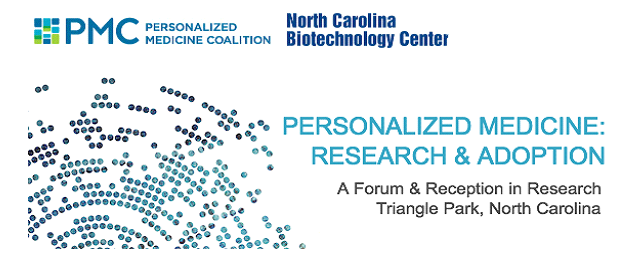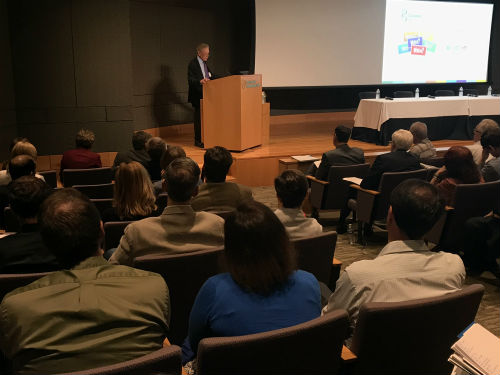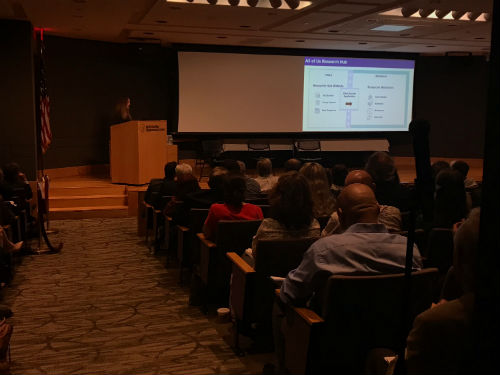
Forum at NCBiotech Spotlights Personalized Medicine

From “find it and fix it” to “anticipate and mitigate.”
That’s how Ralph Snyderman, M.D. -- chancellor emeritus at Duke University -- explains the journey from traditional medicine to personalized healthcare, which is playing an increasingly important role at clinics and hospitals across the country.
The advent of this “new age of healthcare,” as Snyderman describes it, was expected to follow close on the heels of the sequencing of the human genome almost two decades ago. Its development has been slower than many experts anticipated. But personalized medicine is finally here to stay. And, driven by recent advances in genomics and lower genetic testing and sequencing costs, it’s transforming healthcare as we know it.
The research and adoption of this approach -- which uses genetic, lifestyle and environmental factors to develop individualized ways to treat and prevent illness -- was the topic of an April 9 forum at the North Carolina Biotechnology Center. Snyderman was one of the moderators. More than 100 guests from industry, academia and government attended.

The North Carolina Precision Health Collaborative (NCPHC) and the Personalized Medicine Coalition (PMC) sponsored the event. NCBiotech and its partners from biotechnology, research, academia and healthcare created NCPHC in 2016 with the goal of establishing North Carolina as a leader in personalized healthcare. PMC is an international education and advocacy organization based in Washington, DC. It promotes policies that support personalized medicine and related products, advance reforms that lead to a friendlier regulatory and reimbursement environment, and encourage physicians to integrate personalized medicine into clinical settings.
PMC President Edward Abrahams, Ph.D., emphasized the importance of advocacy in his opening remarks to forum attendees. “Science alone doesn’t translate into better patient care,” he pointed out. “We have to change the system through better education...and move from a siloed approach to one of shared values.”
Research leads to growth of personalized medicine
Geoffrey Ginsburg, M.D., Ph.D., director of Duke University’s Center for Applied Genomics and Precision Medicine, introduced the forum’s two keynote speakers, who highlighted the role of research in the growth and development of personalized medicine.

Stephanie Devaney, Ph.D., is deputy director of the "All of Us" program funded by the National Institutes of Health. Her organization was created in 2015 to help advance personalized medicine. ”All of Us” hopes to collect the health, lifestyle and environmental data of more than a million volunteers from across the country to speed the pace of research and to accelerate medical breakthroughs.
The program, the largest of its kind ever attempted, will help develop better ways to measure disease risk by considering genetic, socioeconomic, environmental and other factors. That should lead to better and more individualized treatments. Congress has authorized $1.45 billion for the project.
“Our mission is to change the way we do healthcare in this country,” Devaney explained. “We want to learn information about human health that’s game changing.” She said more than 210,000 volunteers already have enrolled in the “All of Us” program.
A second keynoter, Catalina Lopez-Correa, M.S., Ph.D., is chief scientific officer and vice president of sectors for Genome British Columbia. She also is co-chair of the Global Genomic Medicine Collaborative.
Genome British Columbia applies genomics to all areas of the life sciences, Lopez-Correa said. It presently supports 145 precision health projects on Canada’s west coast. The goal is to “move from research to impact,” she added. “We want to take genomics to a solution provider level.”
Panel includes NC experts on clinical adoption of personalized medicine
The forum ended with a panel discussion, led by Snyderman, that engaged several of the area’s leading experts on the clinical adoption of personalized medicine. They included Gabriela Lavezzari Ph.D., MBA, senior director of U.S. R&D policy and scientific affairs at GlaxoSmithKline; Janet McCauley, M.D., MHA, senior medical director of clinical effectiveness at Blue Cross Blue Shield of North Carolina; Jai Patel, Pharm.D., chief of pharmacology research, Phase 1 trials at Atrium Health’s Levine Cancer Institute; and Shelby Reed, R.Ph., Ph.D., professor of population health sciences and medicine at Duke University.
The panel considered the economic challenges of delivering high-quality personalized healthcare, and discussed the importance of collecting and evaluating data to provide evidence of improved patient outcomes. The goal is to deliver the best and most personalized medical results as cost efficiently as possible.
Panelists agreed that new gene and cell therapies can deliver substantial public health benefits, but may require a hefty up-front investment. So the value of using these treatments, and how they are paid for, should be based on their long-term benefits. Panelists also stressed the importance of factoring patient preferences and trade-offs into treatment decisions.
“It was a tremendous afternoon,” said Sara Imhof, Ph.D., NCBiotech’s senior director of precision health. “This is a topic that has huge implications for all North Carolinians. It’s impressive when you can assemble this much expertise on personalized medicine in the same room at the same time.”
Three prominent North Carolina life science companies -- Inivata, LabCorp, and Optum – sponsored the forum.
